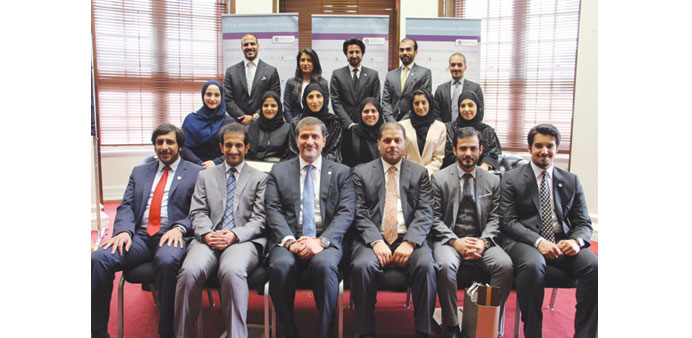The young Qatari diplomats who completed the training yesterday in London with ambassador Yousef Ali al-Khater at the graduation ceremony.
By Denise Marray
Gulf Times Correspondent/London
The Qatari diplomatic corps received a fillip with a group of 16 young diplomats completing an intensive six-week training at the Royal United Services Institute (Rusi) in London yesterday. To mark the occasion they attended a reception at the Qatar embassy, hosted by ambassador Yousef Ali al-Khater.
Speaking at the reception, al-Khater urged the diplomats to immediately put into practice what they had learnt on the course and apply the precepts within their own work environment even if this meant overcoming resistance from those who had entrenched working methods.
He commended the group for successfully undertaking the programme – an opportunity which was not available to earlier generations of diplomats.
Dr Jonathan Eyal, international director, senior research fellow, Rusi, told Gulf Times that the training programme was intended to be “a long term investment for the creation of a new generation of public servants in Qatar that have a broader exposure to the world and the kind of debates that take place in other parts of the world”.
“This course is a supplement to the university degree – it is a professional course. The idea is not merely to learn new things, but to learn how to deliver initiatives and to cope with situations under stress.”
Vice admiral Rory McLean, vice chairman, Rusi, explained some of the key aspects of the programme.
“The first is exposure to really senior diplomats and foreign ministers through our network.
“There is also the issue of the discipline involved in being a diplomat. You can’t be late – you must have read your brief and be fully informed; and the most important thing is going into the detail of problem solving. Qatar is playing an increasing role on the world stage. Whatever the task assigned, it is very important to know how to build and lead a team.”
It is essential to be crystal clear at the outset on the precise requirements of any given task, and in the case of any uncertainty to go up the chain to get clarification.
“If they are not sure exactly what the task is, they need to go one or two steps up the command chain to clarify,” he said.
Dr Kathryn Vagneur, trustee of Rusi and chair of the Finance Committee, taught commercial diplomacy at the outset of the programme. “We had a strongly contested debate about whether Qatar should expend resources on having commercial diplomacy in their embassies. At first they were tentative and cautious about expressing themselves. Now they are very forthright,” she commented.
“They are applying the concepts taught in the course. In an exercise conducted at the end of the programme around a Qatar-based medical research issue they put together a credible plan that would have cost up to $100,000 had an outside consultant been brought in on behalf of the government.”
Sultan al-Khayarin, third secretary, Department of International Development, who has served in Panama where he established the embassy, spoke about his experience of the programme.
“Each one of us has a skill and they knew how to improve our skills; for example, public speaking, dealing with the media, how to frame questions, how to work under pressure, how to operate as a team and co-ordinate the work.
“Over the six weeks we dealt with a range of subjects; the course is like a start engine, and we can now build on the foundation we have been given.”
Najah al-Emadi, senior editor in the Information Office of the Ministry of Foreign Affairs, said she had gained a great deal from the programme.
“I learnt a lot; from the third week onwards I found a great motivation to get back to Doha and apply what I have learnt. The course has changed the way we think,” she said.
Rusi, founded in 1831 by the Duke of Wellington, is an independent think tank engaged in cutting edge defence and security research. It was in 2014, that Rusi won a contract to offer its first diplomatic training course to a group of young Qatari diplomats.
The 16 diplomats who completed the course yesterday represent the second group to undergo the specialised training.

